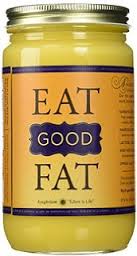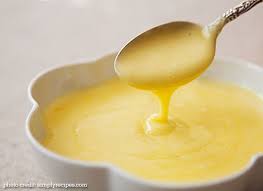
Some of the most impressive benefits of ghee include its ability to protect your gastrointestinal system, balance your cholesterol levels, provide additional energy, reduce inflammation in the joints, eliminates certain allergy concerns, protect you from various chronic disease, improve your eye health, strengthen your immune system, and even prevent certain types of cancer.

Ghee (Clarified Butter)
Butter might be one of the most beloved types of food on the planet, because it makes everything taste so good, but there are other even more delicious alternatives to butter, some of which have been around for thousands of years. Ghee is a clarified type of butter, meaning that it is butter that has been simmered into a concentrate and the residue has been removed. What remains is basically a pure combination of fats, without any milk residue, which means that it does not need to be refrigerated. Ghee can last for months, or even years, without refrigeration, which made it very popular throughout history, before modern times and refrigeration.
Ghee has a rather unique and flavorful taste and aroma that is different from butter, but it can be used in almost all of the same ways. Now, butter can be very dangerous for people due to the high concentration of fat, and ghee is no exception; in fact, ghee is pure fat, so only small amounts are needed, or else it can have negative effects on your health. If eaten in moderation, ghee can provide your body with higher concentrations of other essential nutrients that aren’t available in butter.
Nutritional Value of Ghee
Ghee may be composed primarily of fats, but it also contains significant levels of vitamin A, vitamin E, and vitamin D. Although many people think of fats as unhealthy elements of your diet, the body also needs fat to function. Omega-3s (monounsaturated fats) are healthy forms of fat that can be found in ghee, in addition to other fatty acids like conjugated linoleic acid and butyric acid, both of which have positive health benefits in the body.
Health Benefits of Ghee
Energy Booster: The wide range of fats that compose ghee include medium-chain fatty acids, which are very useful for the body and can be processed by the liver and burnt as energy, not passing into adipose tissue or contributing to weight gain. For athletes or other people with active, high-energy lifestyles, ghee can provide the necessary burst of energy that you might need to get through a particularly challenging day!
Allergy Issues: Since ghee is dairy-free (having had all of the dairy residue simmered off), lactose intolerant individuals or those who cannot consume butter are free to enjoy the flavorful treat of “butter” in the form of ghee without worrying about the gastrointestinal problems that normally follow.
Heart Health: Although most people associate butter with fat and a decline in heart health, the rich variety of fats in ghee can also provide a healthy boost to the heart. Omega-3 fatty acids can help decrease your levels of unhealthy cholesterol and provide an energetic balance to your fat intake.
Reduce Inflammation: Ghee possesses butyric acid, which is one of the most beneficial short-chain fatty acids that the body needs. Butyric acid has been shown, in recent research, to actually decrease inflammation in parts of the body, particularly in the gastrointestinal tract, and is now a recommended dietary addition for some people with ulcerative colitis. Furthermore, ghee enemas have long been used in traditional medicine for inflammation of all kinds.
Antioxidant Activity: The health benefits of vitamin A are widely publicized and the power of carotenoids in terms of eliminating free radicals in the body are extremely valuable. When you add the antioxidant capacity of conjugated linoleic acid and butyric acid to the power of vitamin A contained in ghee, you have a powerful anti-cancer substance that could help reduce oxidative stress throughout the body.
Eye Health: The significant levels of vitamin A in ghee make it ideal for protecting eye health. Carotenoids are antioxidants that specialize in eliminating and neutralizing the free radicals that attack the macular cells, thereby preventing macular degeneration and the development of cataracts.
Immune System Booster: Butyric acid, perhaps the most important element in ghee, has also been linked to the stimulation of T-cell production, which are the heavy-hitting cells of the immune system. In other words, ghee can supercharge your immune system in addition to all of its other health benefits!
A Final Word of Warning: All of the benefits mentioned above make ghee sound like an ideal substitute for butter; however, as mentioned a number of times, ghee is made purely of fat, so excessive consumption of ghee can dramatically change your fat intake and can act as a negative dietary choice. Be careful about your intake and study the fat content of the ghee you choose to consume. Also, speak to your medical professional to ensure that your fitness level can handle a shift to a higher fat diet. ![]()

